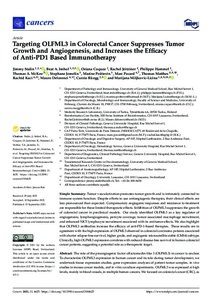Targeting OLFML3 in colorectal cancer suppresses tumor growth and angiogenesis, and increases the efficacy of anti-PD1 based immunotherapy
Coquoz Oriana; Delorenzi Mauro; Hammel Philippe; Imhof Beat A.; Jeitziner Rachel; Jemelin Stephane; Kaci Rachid; Matthes Thomas; McKee Thomas A.; Miljkovic-Licina Marijana; Pocard Marc; Poittevin Marine; Rüegg Curzio; Stalin Jimmy
https://urn.fi/URN:NBN:fi-fe2021102752662
Tiivistelmä
The role of the proangiogenic factor olfactomedin-like 3 (OLFML3) in cancer is unclear. To characterize OLFML3 expression in human cancer and its role during tumor development, we undertook tissue expression studies, gene expression analyses of patient tumor samples, in vivo studies in mouse cancer models, and in vitro coculture experiments. OLFML3 was expressed at high levels, mainly in blood vessels, in multiple human cancers. We focused on colorectal cancer (CRC), as elevated expression of OLFML3 mRNA correlated with shorter relapse-free survival, higher tumor grade, and angiogenic microsatellite stable consensus molecular subtype 4 (CMS4). Treatment of multiple in vivo tumor models with OLFML3-blocking antibodies and deletion of the Olfml3 gene from mice decreased lymphangiogenesis, pericyte coverage, and tumor growth. Antibody-mediated blockade of OLFML3 and deletion of host Olfml3 decreased the recruitment of tumor-promoting tumor-associated macrophages and increased infiltration of the tumor microenvironment by NKT cells. Importantly, targeting OLFML3 increased the antitumor efficacy of anti-PD-1 checkpoint inhibitor therapy. Taken together, the results demonstrate that OLFML3 is a promising candidate therapeutic target for CRC.
Kokoelmat
- Rinnakkaistallenteet [19207]
